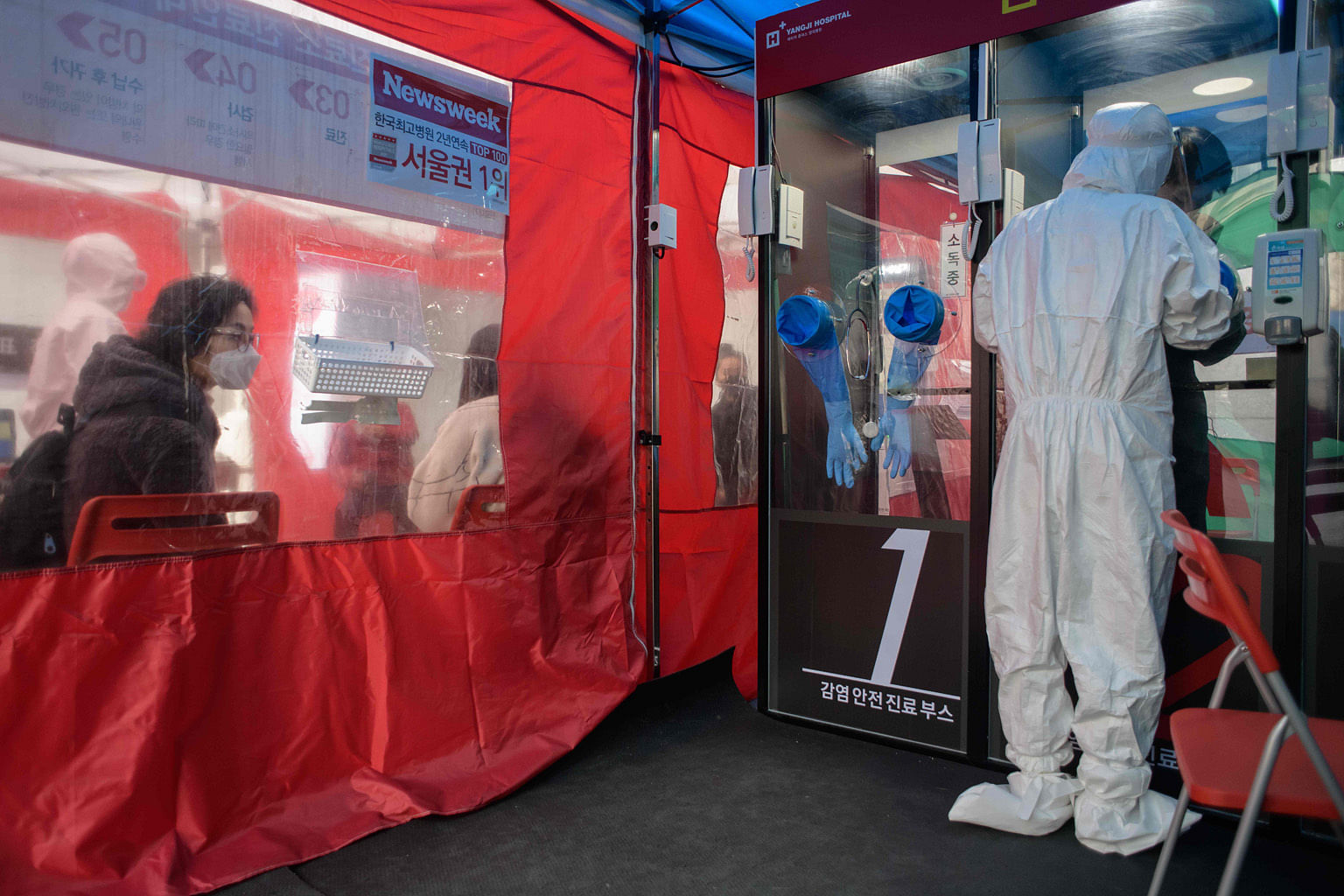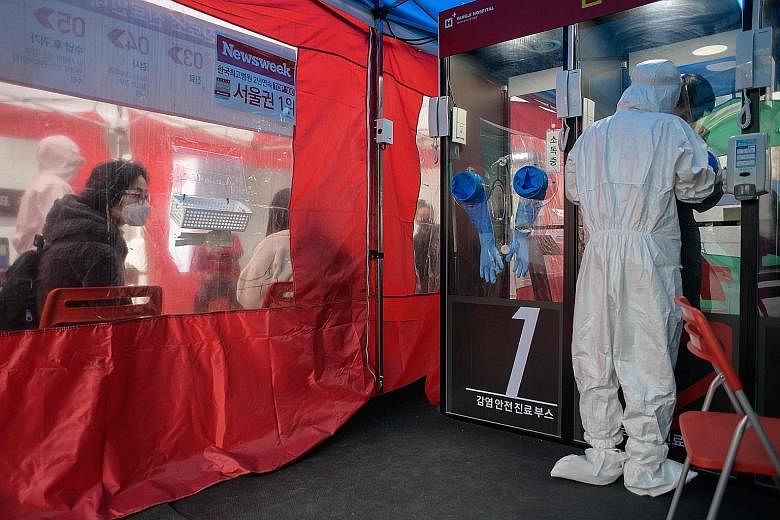Will speed or spirit prevail over the coronavirus?
The world is being put to the test: its countries, people and their jobs. Their temperatures, their will and resilience - are also being tested.
Europe is passed on from Asia the unwanted crown as the new global epicentre of the coronavirus pandemic. Days later, Spain declares a state of emergency after it becomes one of Europe's worst-hit for Covid-19. The United States, too, is seeing a surge in cases.
Europe is experiencing its quietest days ever seen, with most of the continent facing mandatory lockdowns, border closures and bans on public gatherings. While it seems things are stabilising in Asia, the region is not out of the woods either.
The world is certainly shocked not only by the biggest health emergency ever seen, but also by how different parts of the world are coping.
How economies respond to shocks and bounce back is tied to their resilience. But what is resilience exactly? The capacity to renew through innovation and adapt; it measures the ability to withstand and bounce back from shocks, and the speed of doing so. Innovation, or doing things differently, sits on the flip side of resilience.
WHAT MAKES THE DIFFERENCE?
Asian societies such as Taiwan, Singapore and Hong Kong have generally done better in keeping the coronavirus under control. Could Asian societies be more resilient because its people have seen relatively more calamities and the authorities have previously implemented nationwide measures to combat these?
In many Western countries, like the US, it is relatively tougher for governments to unilaterally roll out stringent measures across the entire country. While Asian countries seem similar, a zoom on them reveals differences; just like in the West.
Japan and Finland's populations are homogeneous, but Malaysia and the United Kingdom's are diverse. Clearly, a country's culture alone cannot explain resilience.

Asia's economies include the technologically most sophisticated. But excellent IT infrastructure in Singapore and South Korea have not translated into similar scores in resilience. Where China, Taiwan, Hong Kong and Singapore are better at adjusting to life with the virus, South Korea and Japan had more difficulties.
Does wealth make a difference? For many, Singapore is home to the "crazy, rich Asians", in print and on the screen. With "crazy" meaning fiction-like, rich reflects Singapore's continued outstanding competitiveness performance.
But it's not all glory in the rich East. Singapore is facing a second wave from imported infections as its citizens return from overseas, and Japan - a large and rich economy - has made the tough decision to postpone the Tokyo Olympics in summer. It is the same in Europe, where Italy is economically more prosperous than Greece, but also more impacted by the outbreak. Clearly, technology and wealth are not enough. So how to make sure this doesn't play out like the film Contagion, as the Twittersphere fears?
Could technological and economic systems explain a country or region's resilience?
RECONCILING SPEED AND SOCIETY'S VALUES
Which policies were efficient when the pandemic hit? Diverse approaches to address emergencies such as Covid-19 were deliberated upon recently at classes at IMD Business School where I teach. One emphasises the speed or efficiency of action; the other, the adherence to core values of societies and cultures.
Which strategy is proving more effective and where? According to the European Union, resilient countries can absorb shocks, change and ultimately bounce forward to seize emerging opportunities. This draws a similar pattern to what we see in places like China, Singapore and Taiwan.
While European countries looked on, Asian societies publicly acknowledged and isolated hot spots such as Wuhan, sought to quickly provision additional facilities like hospital beds, rolled out comprehensive testing in Taiwan and closed schools in Japan. Companies turned delivery services into safe lifelines for meals and staples. All of this is turning into the new normal already in Asia, while it is not yet readily practised in Europe.
While European countries enjoy reasonable healthcare systems, their ability to gain support for restricting freedom is limited.
Germany used a "bazooka" - unprecedented financial support for the economy - and the EU's finance ministers coordinated in new ways in order to avoid economic fallout. EU countries are largely, like Italy, countries with ageing populations. Italy is working hard to control the spread to save the lives of its elderly.
Of course, Asian countries had learning opportunities from the severe acute respiratory outbreak (Sars) in 2003 that Europe did not. One cannot discount the role this plays in Asia's capacity to act fast and decisively.
Asia's action aims at fighting the virus and not the people. Enforced testing - in combination with support in quarantine and treating patients well - can unite people in their fight against the virus.
However, if the measures seem too harsh and disconnected from people's well-being, implementation of reasonable policies is difficult. Where policies show little concern for patients, the fight against the virus looks more like a fight against people.
That is why policies have to find the right balance between speed and society's values. During an emergency response, it is never about getting it right at the onset, but speed matters. However, when an entire population is impacted by a decision, one has to take into account how it may react and perceive stringent measures without being consulted.
That's why a hybrid policy approach - balancing speed and cultural nuances - is key and enables resilience best. It is quick to implement and therefore, more socially acceptable, creating a virtuous cycle with less friction.
Parts of Asia have been quicker than others in adapting to Covid-19. They say necessity is the mother of invention and this held true as companies in Asia started innovating - spontaneously. Factories and offices closed to contain the pandemic spread, and several tested out remote working relatively quickly, especially at this scale. In early February, organisations in China started remote working to some degree. For example, Porsche had its employees in China work from home at the onset of the crisis. At the same time, in Hong Kong, flexible hours and working from home became the new way of life.
Facing a similar reality took more time in the West and adaptation was and is slower. After the WHO was first notified on Dec 31 last year, a dozen Chinese cities had shut down by the end of January.
Yet, already by mid-January, cases had been confirmed in France, Japan, Singapore and Taiwan.
It was only on March 16 that Europe declared war on the virus, two months later. The impotence of late travel restrictions, a lack of data, kits and systematic testing, combined with high healthcare costs, may only help the virus, not the people. The EU's coordination role has been quite absent in this crisis, leaving countries to fare by themselves. However, countries like Britain have been swift and bold in economic response with mass wage support to protect jobs.
After Sars and the Middle East respiratory syndrome, or Mers, one would think the world had enough time to prepare. But besides preparation, resilience comes from acting decisively and in sync with societies. Hybrid approaches that strike the right balance, as found in parts of Asia, seem to be a best practice. If we can better blend the strengths of the West and the East as we brave through, one hopes the lessons learnt from either side of the pond under distress will enable both to meet each other faster and help each other pass, and not fail, such tests together.
- Patrick Reinmoeller is professor of Strategy and Innovation at IMD Business School in Switzerland and Singapore.

